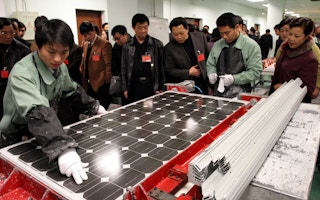The 1 percenters of the US have been in the news a lot lately. Guess how much the top 1 per cent of earners in the world make?
According to the Global Rich List, an annual salary of about 32,000 US dollars would place you in the top 1 per cent. 32,000 United States dollars – I am not missing a zero. This roughly translates into a sixteen dollar per hour wage, to get into the top 1 per cent globally. I would guess that most people reading this article make that wage. This is by no means a comfortable income in many countries but spare a thought for the 99 per cent of people who live below this wage – most of them live in a different reality from this 1 per cent.
The focus of this article is not inequality, which is a growing problem, but to think about who is responsible for climate change and more importantly, who is going to solve our climate challenge?
Dollarstreet, explores how incomes influence how we live. You can be living in Europe, but if you have the same income as someone in India, your homes, your cars, and your appliances, look similar.
What if we look at CO2 emissions based on our incomes rather than where we are from? If you are in this top 1 per cent, wherever you live, you are responsible for emissions: driving around in a car, taking overseas vacations, heating up your house, cooling down your house and a host of other luxuries that 99 out of a 100 people don’t have.
What if we look at the influence of this 1 per cent, which includes not only billionaires and CEO’s, but also engineers, regulatory officers, accountants, financial analysts and diverse mix of other professionals? These are the people who benefit from the CO2 emitting system, but also are the ones who design, finance and operate the system.
I am not saying that we must give up our luxuries, but that we should take responsibility for those 99 people out there, who don’t have the same influence you do.
There are three ways to look at this influence. Our personal CO2 contribution, our influence in the economy, whether at work or in the market, and our influence on government.
“
If you are in this top 1 per cent, wherever you live, you are responsible for emissions: driving around in a car, taking overseas vacations, heating up your house, cooling down your house and a host of other luxuries that 99 out a 100 people don’t have.
Personal influence
On the personal front I think a lot of us have already started on the journey of less emissions, because burning less fuel is just cheaper. Keep up the good work!
But there is always more we can do, and there are many resources that advise us on how to reduce our emissions, including eating less meat, using mass transport or bicycles, and installing solar panels on your roof.
If you are thinking about installing a solar roof, but the financial advantage doesn’t seem appealing enough, think about the 99 people you are protecting from the effects of climate change.
Energy production is only one side of the equation, there is also energy saving. Insulating your house both reduces emissions and saves on energy costs. Simple changes like using a fan with air-conditioning on a higher temperature can really save a lot of energy.
Influence at work
As a 1 percenter we usually are in a position to influence decisions at our workplaces. Those 99 people need you to push your factories (including those overseas, like in China) to buy renewable energy, to install solar power on roofs, and invest in energy efficient or energy saving technologies.
As a professional from the solar power industry, I have worked with building managers who have led solar installations on their facilities, putting in the effort to convince sometimes suspicious senior managers. That is the kind of leadership we need.
I have worked as a structural engineer, a supply chain manager and a project manager, and in all those roles there have been opportunities to reduce CO2 emissions, and as a result also costs. Either by optimising concrete volumes by running better computer analysis, or using higher concrete strengths, or by reducing air freights of goods or using web communication rather than taking flights. If you include CO2 as a cost in your daily transactions, it could be a start to saving emissions as well as saving money.
“
As a professional from the solar power industry, I have worked with building managers who have led solar installations on their facilities, putting in the effort to convince sometimes suspicious senior managers. That is the kind of leadership we need.
Influence on government and policy
This is where most of the climate change mitigation still sits.
There is research to show that people in lower income brackets vote less, and that this is an increasing trend.
In general, higher income earners tend to vote with narrow economic interests, and tend to deprioritise social programmes, including policy to combat climate change.
Why this is happening and how this disenfranchises the people more likely to be affected by climate change is an issue deserving its own analysis. But what I think is important is to really take responsibility for our vote. We are voting on behalf of people who are not part of the democratic process to act on climate change.
Apart from voting, the global 1 percenters usually have better understanding on how to navigate the governmental mechanisms of a country, how to use the system and how to drive action.
For example, I was part of a discussion where an officer of an environmental agency pushed to maintain a regulation for tree cover at car parks - these trees would have covered and disabled the solar panels we were proposing. It took a collective effort from the client, our consultants and our team to argue the CO2 emissions savings and the energy benefits of the system, which eventually got us a waiver.
Whether getting regulatory waivers for solar, making CO2 emissions reductions part of the goals at grass roots initiatives or raising emissions concerns to your elected representatives, you are able to have those tough conversations to drive the change we need.
I am not saying that people in lower income groups don’t have a part to play in mitigating climate change – I think it needs of all of us to do everything we can.
I am also not saying that our personal responsibility absolves companies and governments that are most responsible for emissions. But I think the time has come for us to get all hands on deck, shift into hyperdrive and throw everything including the kitchen sink at climate change.
We are a part of these companies and governments, and along with the work of activists and politicians we have a big role to play in solving climate change. We may be drops in an ocean, but it is drops that make up an ocean.
We recently welcomed a new little girl to our family, she greets everyday with unabashed curiosity, with a love for our world that I had grown out of. She can teach us how to love this world, but she needs us to step up, like how Greta Thunberg the Swedish climate activist needs us to step up. Greta eloquently summed the status quo recently at Davos:
“Some people, some companies, some decision-makers in particular, have known exactly what priceless values they have been sacrificing to continue making unimaginable amounts of money. And I think many of you here today belong to that group of people.”
We are part of an unequal world, an unfair system. But we can choose to look at our privilege as a responsibility and use our influence to fight humanity’s greatest threat.
Nabeel Ismeer is a project manager in the renewable energy industry and a new father to a curious little girl. He says he wants to be part of the effort to tackle climate change and other big issues we face as global citizens.


















